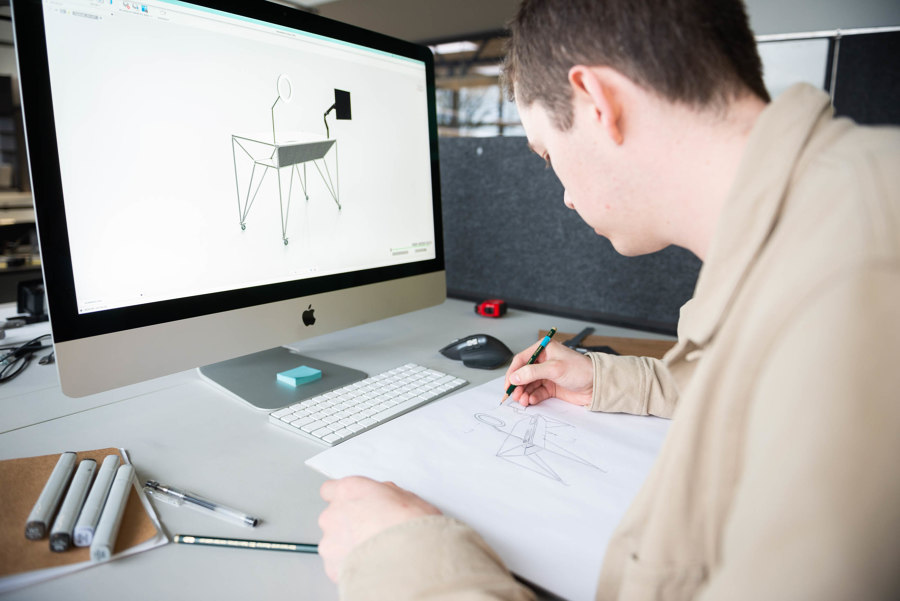Distance relationship: SYSTEM 180
Brand story by Mareile Morawietz
Berlin, Germany
04.03.21
How to design for remote work in the future? SYSTEM 180 has connected (via video conference) with the HPI D-School in Potsdam to develop new ideas for hybrid work spaces.
Versatile studio design: from ring lights to rollable elements to changing backgrounds, everything has been thought of to bring seminars, tutorials, coaching sessions and similar formats online
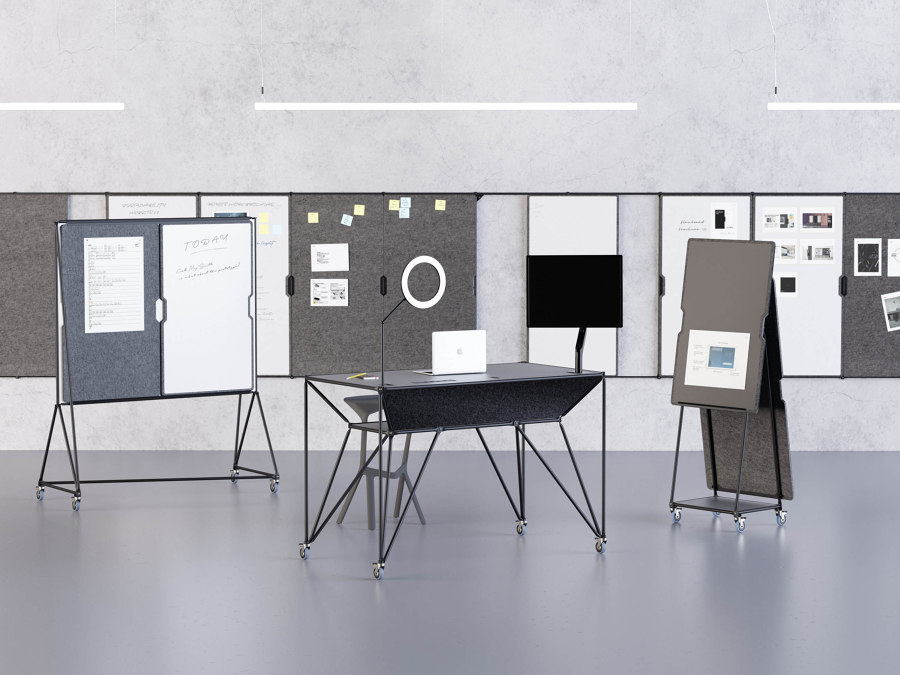
Versatile studio design: from ring lights to rollable elements to changing backgrounds, everything has been thought of to bring seminars, tutorials, coaching sessions and similar formats online
×Cronut, duffins, brookies: the culinary industry has long recognised the ‘hybrid’ trend in foods. But the creation of new hybrid forms is on the rise in other areas as well: city dwellers organise rural lifestyles in an urban environment, and people meet up in virtual and analogue contexts – alternatingly or even in parallel. Transcending the boundaries of time and space is a long-seen tendency in global communications, and has become even more firmly entrenched since the pandemic.
While baked good mash-ups and urban country life have been widely adopted, the hybridisation of the working world is still in its infancy. But companies like System 180 are driving the phenomenon forward: together with the School of Design Thinking at the Hasso Plattner Institute in Potsdam (HPI D-School), the Berlin-based firm is now developing spatial concepts that not only function within either an analogue or virtual space, but in both at the same time.
Anticipating the future of agile work is nothing new for the experienced manufacturers and developers of System 180, together with the students and leadership of the institute. The innovative cooperation between the sustainable company and the privately funded IT institute began 13 years ago. At that time, the newly founded HPI D-School was looking for flexible furniture that would be especially conducive to teamwork.
The prototype for a hybrid workstation from System 180 leaves space for additional equipment while also impressing with its simple design
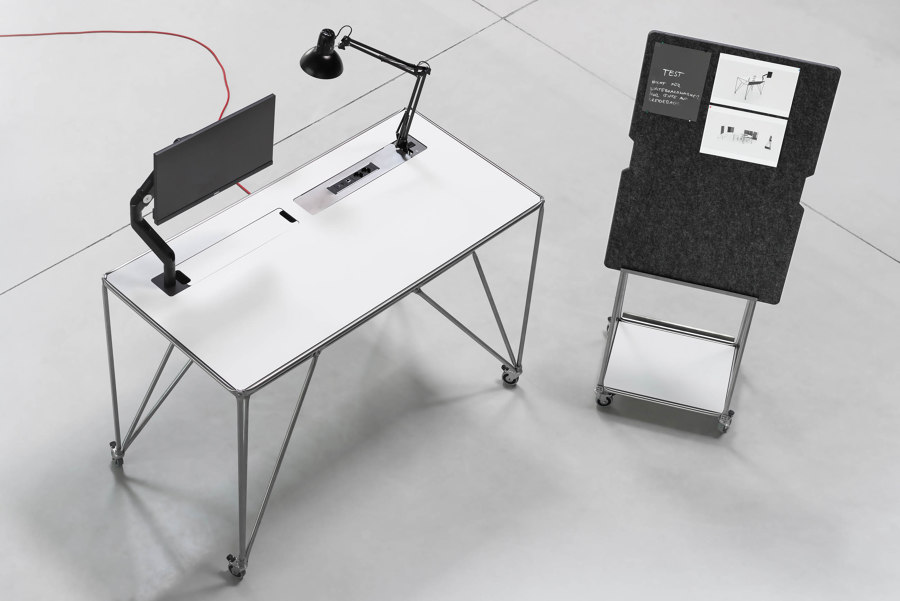
The prototype for a hybrid workstation from System 180 leaves space for additional equipment while also impressing with its simple design
×In contrast to classic office furniture, System 180’s highly flexible modular system was a perfect match for the school of innovation’s requirements – enabling optimum collaboration thanks to its easy adaptability. This usage concept gave rise to the Design Thinking Line®, which is now an integral part of the System 180 portfolio, providing an ideal response for the current boom in agile working methods.
The (travel) restrictions of recent months have made virtual conferences a routine occurrence. Even if they cannot completely replace physical collaboration, they will remain a part of the new normal
The (travel) restrictions of recent months have made virtual conferences a routine occurrence. Even if they cannot completely replace physical collaboration, they will remain a part of the new normal. The advantages are clear: global networking of participants, travel cost savings, spontaneity despite distance, communicative seeing and being seen in the best sense, the easy exchange of opinions, knowledge and documents, and much more.
The flexible elements create functional spaces that connect analogue and virtual participants so they can work together as a team on an equal footing
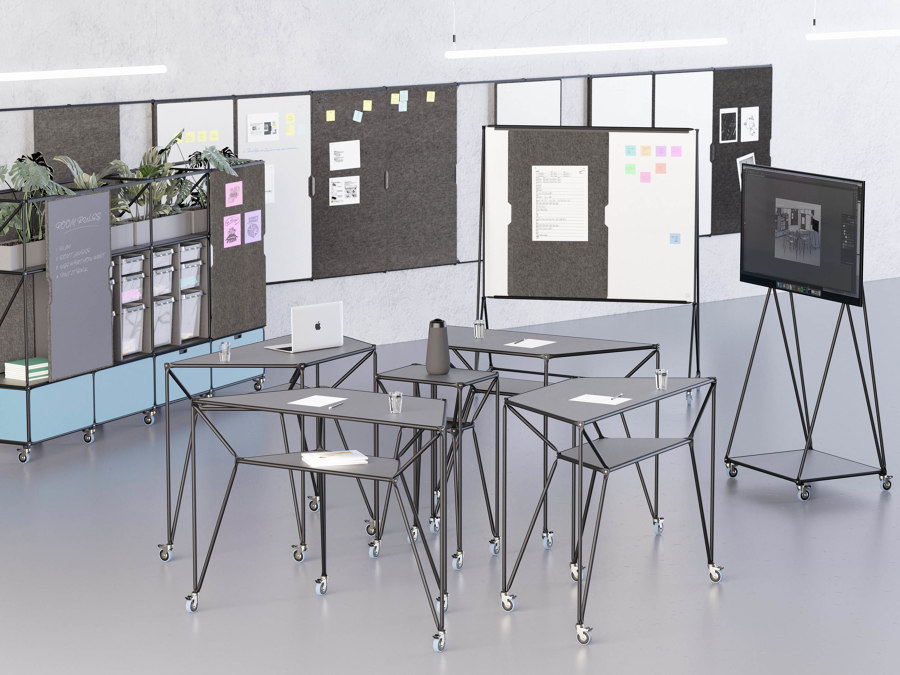
The flexible elements create functional spaces that connect analogue and virtual participants so they can work together as a team on an equal footing
×Diverse tools, virtual whiteboards, multi-communicative messenger services and collaborative project management programs ensure dynamic exchanges in the virtual realm – 24/7. Digital trends will not be abandoned after the pandemic. According to surveys, business trips will decrease by 50 per cent and a good third of all companies plans to retain remote work as a complementary concept and actively promote agility.
The HPI D-School team faces the complicated challenge of facilitating collaborations with virtual and analogue participants at eye level in disparate contexts. The requirements for the modules were defined together with the students after the customer insight phase at the end of 2020, and initial ideas for hybrid interior concepts and furniture for various functional spaces were developed in cooperation with System 180.
In addition to studios for the production of webinars, moderator workspaces for leading conferences as well as workstations for coaches who supervise agile teams online, dynamic team areas for groups of up to six participants play a central role in the design thinking process. Such teams already need highly flexible collaborative spaces in physical work environments in order to foster creativity. In a hybrid setting, these demands increase exponentially.
The HPI D-School team works closely with System 180 manufacturers and developers to design hybrid furnishing concepts for a diverse range of usage situations
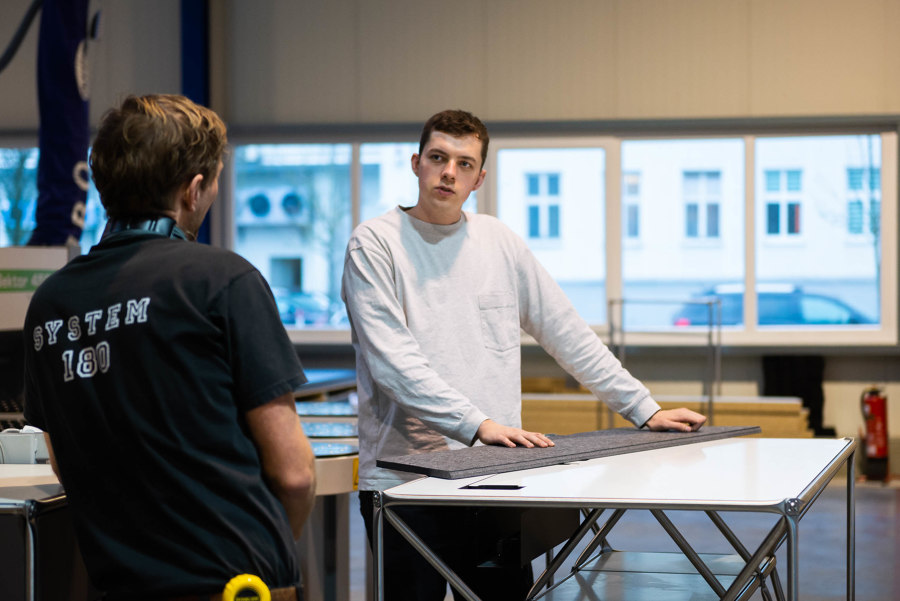
The HPI D-School team works closely with System 180 manufacturers and developers to design hybrid furnishing concepts for a diverse range of usage situations
×The main focus of all prototypes is the effective integration of monitors, cameras, microphones, lighting and speakers in the given setting. This is not only about creating a coherent design and a perfect collaborative user environment, but also about maintaining a sense of belonging: all participants are part of a whole – regardless of the space they are occupying.
The first prototypes are currently being tested at the Hasso Plattner Institute. A great advantage of the Design Thinking team is that they are not hesitant in embracing multiple iterations. In the open innovation process, the latest options in technical equipment are discussed, ergonomics, function and design are critically considered, and the arrangement of the modules in the overall layout is evaluated and taken into account.
Digital trends will not be abandoned after the pandemic. According to surveys, business trips will decrease by 50 per cent and a good third of all companies plans to retain remote work as a complementary concept and actively promote agility
The new modules therefore also represent a logical evolution of the Design Thinking Line®, whose coordinated elements already help planners to design mobile spaces for different project phases and varying team requirements. The geometric design and flexible functionality of the product line allow for alternating phases of concentration or communication, creative work or training sessions.
Smart from experience: the HPI D-School teams also connect with System 180 via video conferencing to advance ideas for hybrid spaces
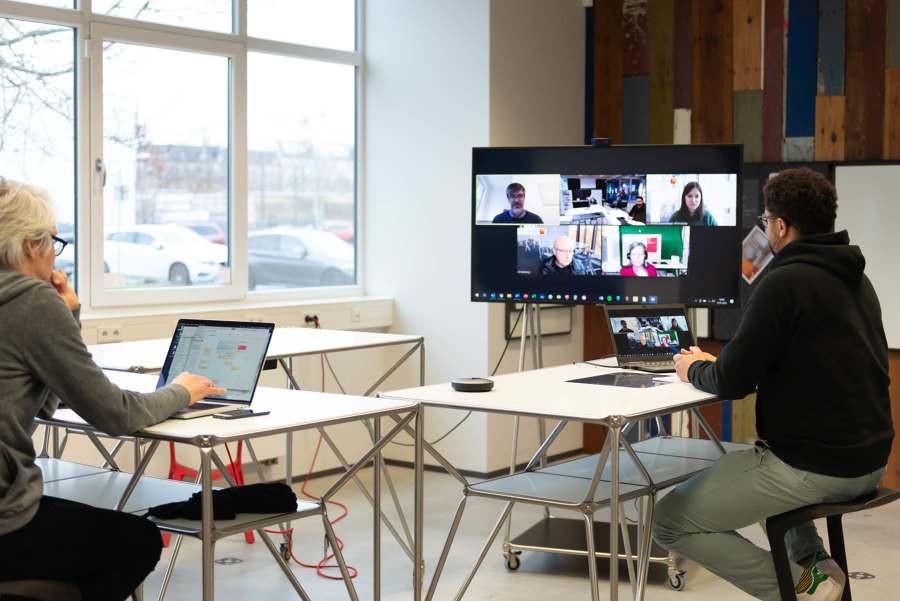
Smart from experience: the HPI D-School teams also connect with System 180 via video conferencing to advance ideas for hybrid spaces
×As experienced pioneers, the experts at System 180 know that new visions undoubtedly build on proven ideas and that tried-and-tested principles complement innovations: the FlexBoard Pro will enrich the hybrid working world with its flexible versatility and matt surface in non-reflective enamel for video conferences, while the Table T6, as a modular trapezoidal table, can be functionally adapted to a diverse range of future interiors.
What will continue to define this next-level furniture for agile working 4.0 is, of course, the quality and sustainability of System 180, which provides architects and interior designers with a guaranteed supply of robust constructions and premium materials. As a creative partner, the HPI D-School shares these aspirations and ambitions. Together they are setting new (product) standards.
As with other hybrid developments, where a combination of seemingly contradictory elements results in something greater than the sum of their parts, the hybrid working world created by System 180 and the HPI D-School becomes a highly flexible environment for collaboration and teamwork above and beyond spatial boundaries. We will find out what this looks like this coming autumn when the modules reveal the virtual and analogue future – technically, aesthetically and pragmatically.
© Architonic




